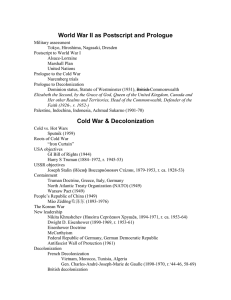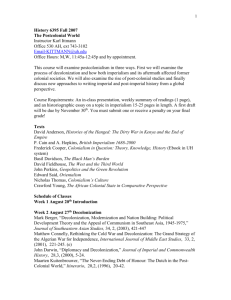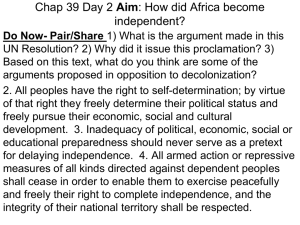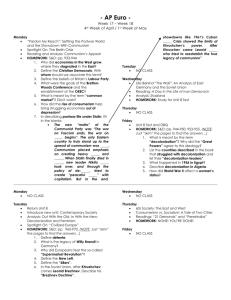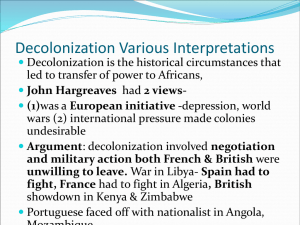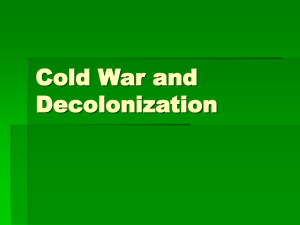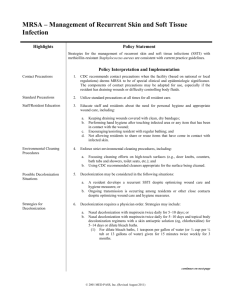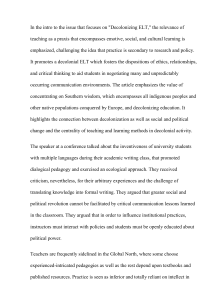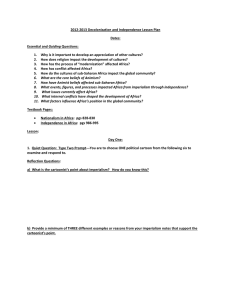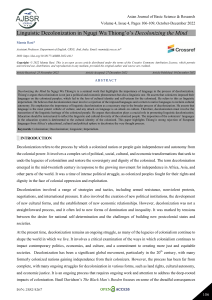Decolonization
advertisement
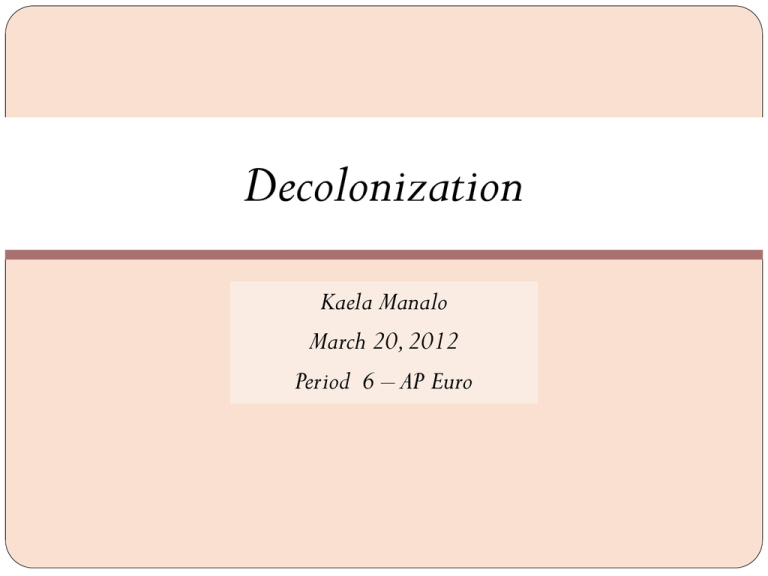
Decolonization Kaela Manalo March 20, 2012 Period 6 – AP Euro FRQ Question 2005~ Analyze the factors responsible for decolonization since the SecondWorld War. What is decolonization? Decolonization: Basic cause of imperial collapse that was the rising demand of Asian and African peoples for national selfdetermination, racial equality, and personal dignity. ˉ Political independence ˉ Spread from intellectuals to the masses in nearly every colonial territory after World War I ˉ Resulting in colonial empires to be shaken up by 1939 & eventual triumph for independence movements Map ofWorld Divided primarily along religious lines into two states, British-India led the way to political independence in 1947. Most African territories achieved statehood by the mid-1960’s, as European empires passed away, unlamented Europe AfterWorldWar II - Europe divided into two blocs - Churchill’s “iron curtain” split Germany and Europe into two antagonist camps - Economic conditions were terrible. - Empires focused on rebuilding at the home - Had little taste for bloody colonial wars - No longer believed that their superiority was technical, military, spiritual, and moral India’s role in decolonization Mohandas “Mahatma” Ghandi - Built a mass movement preaching nonviolent “noncooperation” with the British - India requested independence - Labour Party came to power and relinquished sovereignty - Conflict posed by India’s Hindu and Muslim populations resolved through the creation of the two states, Hindu India and Muslin Pakistan China Chinese Nationalism - Triumphed in the framework of Marxist-Leninist ideology - Alliance w/ Guomindang (National People’s party) - Unify China and abolish European concessions Mao Zedong (Chiang Kai-shek) - 5000-mile march: built an independent base in Northern China - Won the support of the peasantry by promising to expropriate the big landowners, the better-organized communists which forced Nationalists to withdraw to Taiwan in 1949. - strong centralized state & expelled foreigners - New society along Soviet lines had mass arrests, forced-labor camps, ceaseless propaganda - peasantry was collectivized & focused on the expansion of industry & Countries began to follow - Philippines achieved independence peacefully from the United States (1946) - Britain granted Sri Lanka and Burma independence (1948) - Indonesia emerged as a sovereign state after beating off attempts by the Dutch to reconquer the Dutch East Indies - French, defeated by Ho Chi Minh, after trying to reestablish colonial rule in Indochina (1954) - Indochina was not unified causing two Vietnamese states which led to civil war and intervention by the U.S Countries (Cont.) - French gave up their League of Nations mandates in Syria and Lebanon (1944) - United Nations divided Palestine into two states (1947) - one Arab & one Jewish = Israel - (1948)- Arabs attack Jews, but eventually lost more territory. 900,000 Arabs fled/expelled - Egypt’s Gamal Abdel Nasser drove out the pro-Western king - nationalized the Suez Canal Company (last symbol of Western power in the Middle East) - British & French invade Egypt (was a failure& Egypt triumphed) - General de Gaulle accepted Algeria’s self-determination which then became independent - Causing its European population to flee to France Africa - 1958: General de Gaulle offered the leaders of French black Africa the choice of a total break with France or immediate independence within a kind of French common wealth - All but one chose association with France because they identified with French culture and wanted aid from France - French saw Africa as an untapped sources for industrial goods, raw materials for factories, outlets for profitable investment, and good temporary jobs for engineers Africa (Cont.) Results: - Enhanced Western presence in African states through the lure of special trading privileges and heave investment in French and English language education Neocolonialism: A system designed to perpetuate Western economic domination and undermine the promise of political independence - extending Africa to economic subordination In conclusion… *All of which are the factors that lead to decolonization* 1. Old ideals seemed impractical 2. India and China had a domino affect and caused other countries to follow them in their attempt to gain political independence 3. Need for reconstruction kept European nations unable to wage military forces strong enough to maintain colonies 4. Increased tension between NATO and USSR
